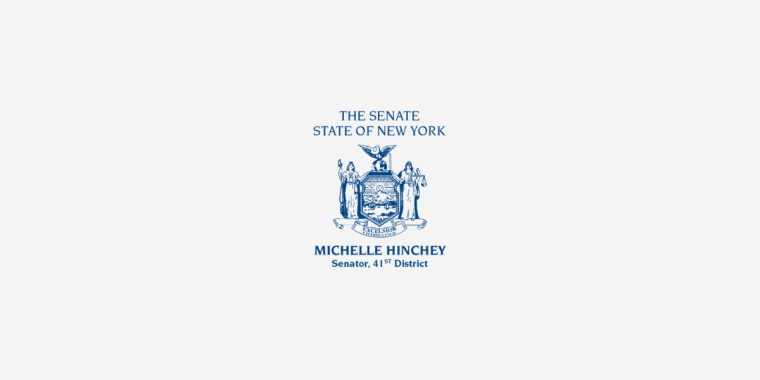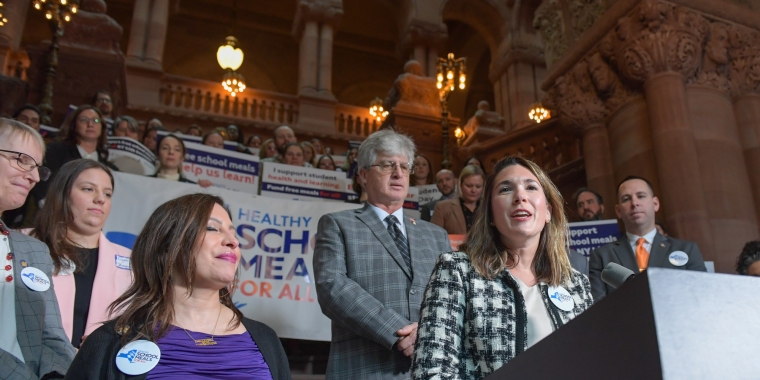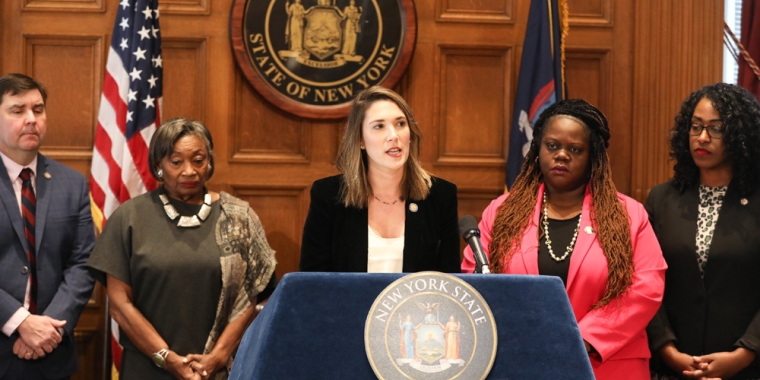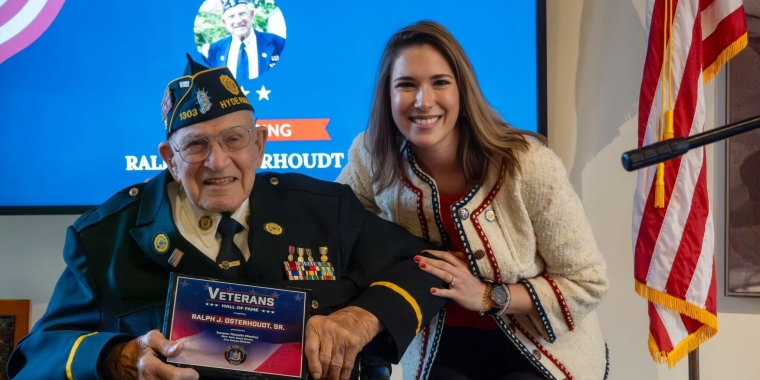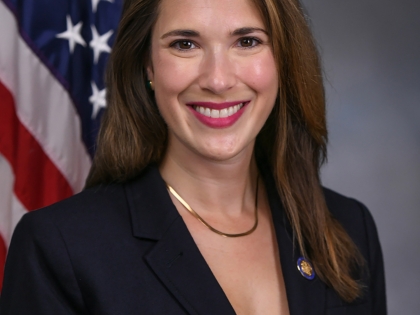
Senator Michelle Hinchey Announces Key Funding Wins for Upstate New York in Senate One-House Budget Resolution
March 15, 2021
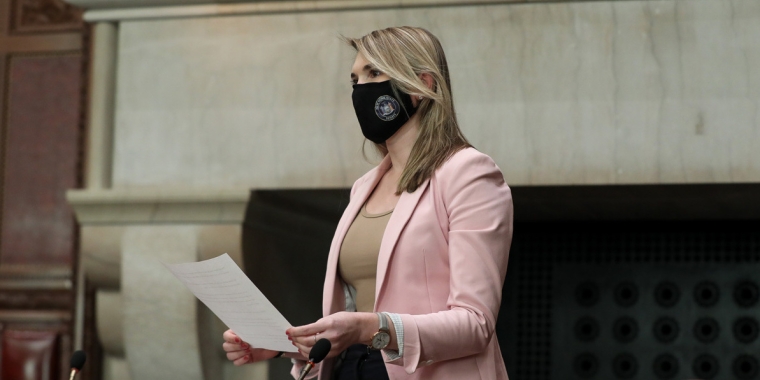
ALBANY, NY – Today, the New York State Senate will pass its one-house budget resolution that delivers emergency aid to help New York recover from the COVID-19 pandemic and includes historic investments championed by Senator Michelle Hinchey (SD-46) to provide, for the first time, targeted funding for stewardship efforts in the Catskills region, and, a plan to deliver $400 million in new property tax relief for middle-class taxpayers. The Senate resolution also includes initiatives supported by Hinchey to protect and expand investments in Upstate infrastructure, rural health services, New York agriculture, and other areas critical to the well-being of residents in the 46th Senate District.
“As the new state senator for the 46th District, I have promised to bring better, more equal representation to our middle-class and working families in Upstate New York,” said Senator Hinchey. “Our budget proposal is a testament to the work we’re doing to advocate for the needs of Upstate and rural New Yorkers, and I’m proud that we were successful in creating a resolution that lays the groundwork for our state’s economic recovery while ensuring essential community needs continue to be funded. Our proposal features historic investments in environmental stewardship, including the first-ever funding line for the Catskills Park, strengthens agriculture as the chief economic driver of our state, puts a targeted focus on closing the broadband gap, and establishes a dedicated plan to reduce the property tax burden on middle-class New Yorkers. This is a budget that works for all of us, and I will fight to protect our priorities in final negotiations.”
Budget priorities that Senator Hinchey advocated for, and that are part of the Senate’s budget proposal, include:
GETTING OUR FAIR SHARE OF LOCAL INFRASTRUCTURE INVESTMENTS
- Support For Local Road Infrastructure: The Senate provides critical funding to maintain our local roads and infrastructure, including $150 million in additional funds for the Consolidated Local Street and Highway Improvement Program (CHIPS), for a total of $588 million in CHIPS funding, and $100 million for the Extreme Winter Recovery Program. These are absolutely essential funding resources that help our local highway departments address the impacts of extreme winter weather and protect the safety of New York drivers.
- Clean Water Funding: The Senate has included, as part of its budget proposal, $500 million for water quality improvement projects to help communities upgrade aging sewer infrastructure, reduce stormwater runoff, and address non-point sources of pollution.
- The Comprehensive Broadband Connectivity Act: The Senate proposal includes legislation co-sponsored by Senator Hinchey (S4878A) requiring the Public Service Commission (PSC) to study internet speeds, costs, and access gaps in New York State. Under the bill, the PSC would be required to provide specific strategies to address the service gaps and prioritize broadband access for communities that have insufficient or absent service.
PUTTING OUR COMMUNITIES FIRST
- Circuit Breaker Income Tax Credit: The Senate budget proposes a new personal income tax credit that would lead to approximately $400 million in new property tax relief for middle-class homeowners who pay more than 6% of their income on property taxes.
- Full Restoration of AIM Support for our Cities, Towns, and Villages: The Senate budget proposal includes a full restoration of $39 million in Aid and Incentives for Municipalities (AIM) funding for cities, towns, and villages to help struggling local governments provide the essential services residents depend on.
- Supporting Small Businesses: The Senate’s proposal invests $1 billion in our small businesses, including $500 million for Small Business Assistance Grants and $500 million for Commercial Rent Relief. Other budget measures to bolster economic growth in our communities include an additional $100 million to the New York State Council on the Arts for grants to non-profit cultural organizations and a total of $2 million for the Minority and Women-Owned Business Development and Lending Program.
- Preserving Public Health Programs: As the senator representing the most rural district in the Majority Conference, Senator Hinchey advocated for funding to the Rural Health Network Development Program and the Rural Access Hospital Program, which the Senate budget proposal has designated $9.4 million for, coming in at $3.2 million over the Executive budget. The Senate’s proposal also provides $624 million to increase the minimum wages for the lowest-paid home health care workers, who have not seen raises in years and have kept working through the pandemic at great personal risk. The Senate’s budget plan restores $180.5 million in Medicaid cuts to hospitals, $74.25 million to long-term care, $60 million to mainstream managed care, and millions more to other Medicaid-supported programs.
- Telehealth Parity: The Senate modifies the Executive proposal on comprehensive regulatory telehealth reform by maintaining flexibilities with distant sites, adding certified peer recovery advocates as eligible providers, and providing reimbursement at the same rate as in-person visits.
- Support for the Joseph P. Dwyer Veteran Peer Support Project: The Joseph P. Dwyer Veteran Peer Support Project is a proven model to help veterans dealing with post-traumatic stress disorder and other mental health issues. The Senate’s budget earmarks $185,000 in state funding to expand this vital program to Ulster County and continues funding for the program in Albany County.
- Universal Pre-Kindergarten for Upstate New York: The Senate’s budget proposal designates $500 million to fund universal, full-day pre-K (UPK) for four-year-olds statewide. The benefits of pre-school education on cognitive development, academic success, and graduation rates have long been recognized though the majority of school districts in Upstate New York do not offer full-day pre-K for four-year-olds. Senator Hinchey and her Upstate colleagues successfully advocated for the inclusion of UPK in the Senate one-house to ensure equity in education spending.
- Assistance for Renters, Homeowners, and Small Landlords: The Senate one-house budget proposal includes initiatives to help New Yorkers stay in their homes while also protecting mom-and-pop property owners. The Senate proposal establishes a federally funded COVID-19 Emergency Rental Assistance Program to provide rent arrears vouchers to landlords on behalf of tenants experiencing financial hardship due to the pandemic. Other initiatives include $400 million in supplemental rental aid for struggling working- and middle-class tenants across the state; $200 million for a Housing Access Voucher Program to help New Yorkers find permanent housing with a cash subsidy to low-income individuals and families who are homeless or facing an imminent loss of housing; and $200 million for homeowner assistance, making sure that middle-class New Yorkers facing foreclosure can keep their homes.
- Rural Housing Investments: The Senate budget proposal increases support to meet the affordable housing needs of rural New Yorkers by increasing Mortgage Insurance Fund support for the Rural Preservation Program to $6.3 million and a $200,000 carve out from Rural Preservation Program funds for the New York State Rural Housing Coalition for technical assistance — a network of housing professionals dedicated to revitalizing rural New York by assisting housing and community development providers.
- Smart Revenue Raisers to Fund our Communities: The COVID-19 pandemic has had a major impact on the economy, and the slowdown in economic activity means billions of dollars less in available revenue than the state would expect in a typical year. To prevent potentially devastating cuts to state programs and services that our communities rely on, the Senate budget proposes a number of creative measures to raise revenue without burdening middle-class and working families. Proposals include legalizing mobile sports betting (projected to raise approximately $79 million annually) and increasing personal income tax rates on households making over $2 million annually — a proposal that would raise revenue for the state by $4.15 billion this year and by $4.75 billion next year, among other proposals. The total revenue raised by the Senate’s proposals is $8.2 billion in SFY 2021-22.
PROTECTING OUR ENVIRONMENT, CREATING GREEN JOBS, AND PRESERVING OUR UPSTATE TRADITIONS
- Targeted Funding for Catskills Stewardship: For the first time ever, the Environmental Protection Fund (EPF), which provides communities with needed resources for a wide range of local environmental projects, includes $200,000 in targeted funding for stewardship efforts in the Catskills region. Direct funding will be provided to local organizations, including The Catskill Center for Conservation and Development, Catskill Mountainkeeper, and the Cary Institute of Ecosystem Studies to support Catskills ecosystem research, and park stewardship and improvement efforts.
- Clean Water, Green Jobs, Green New York Environmental Bond Act: The Senate budget proposal includes an investment of $3 billion for the Environmental Bond Act to reduce the impact of climate change as well as preserve and restore our natural resources, pending approval by voters in November. The Environmental Bond Act is projected to create as many as 65,000 green jobs within the state and presents an opportunity to get people back to work while spurring long-term economic growth and protecting New York’s environment for future generations.
- Expanded Opportunities for Upstate Recreation: The Senate budget proposal concurs with the Executive’s proposal to authorize crossbow hunting for big game to twelve years of age, with adult supervision, and expands the crossbow hunting season, among other provisions. Expanding these measures is important for preserving Upstate New York’s outdoor recreational traditions and is a key component of our conservation initiatives.
FIGHTING FOR OUR FARM ECONOMY AND FOOD SECURITY
- Securing Vital Funding for New York Agriculture: As Chair of the Agriculture Committee, Senator Hinchey successfully advocated for the Senate budget proposal to include over $34 million in state funding for New York's diverse agricultural programs, an increase of over $7 million above the Executive’s proposal, which includes initiatives to protect farmland and provide research, marketing, technical and other assistance to support New York's farms.
- Boosting Support for New York’s Craft Beverage Industry: The Senate budget includes — for the first time ever — a new, independent line item created by Senator Hinchey for New York hops research and marketing.
- Nourish New York: The Senate budget proposal incorporates a bill sponsored by Senator Hinchey (S4892A) to establish Nourish New York, the state’s successful farm to food bank initiative, as a permanent state program through the Department of Agriculture and Markets. The Senate budget proposal delivers $25 million in additional funding for the program to support the continued purchase of New York agricultural products by emergency food providers.
- Equitable Farm Futures Initiative: The Senate budget proposal allocates $400,000 for the Cornell Small Farms Program, which assists agricultural producers in growing and managing their farm and food businesses. Funding would be utilized to expand educational programming with an important emphasis on supporting BIPOC farmers and expanding the "Master Farmer" coursework, which trains Hispanic and Latinx farm employees for management opportunities in agriculture.
